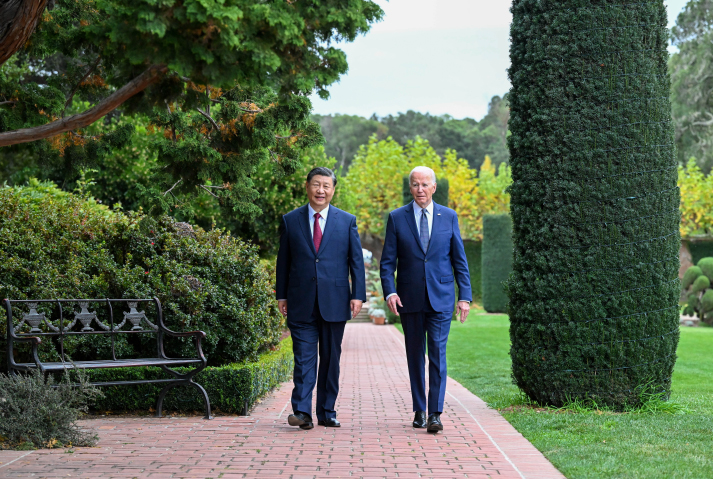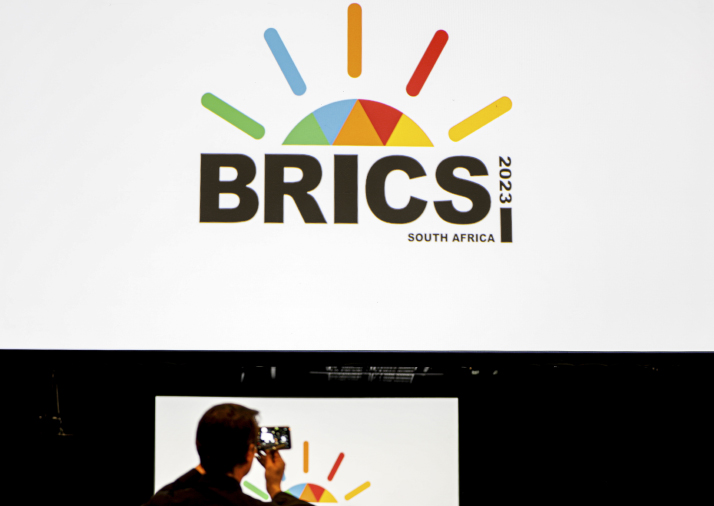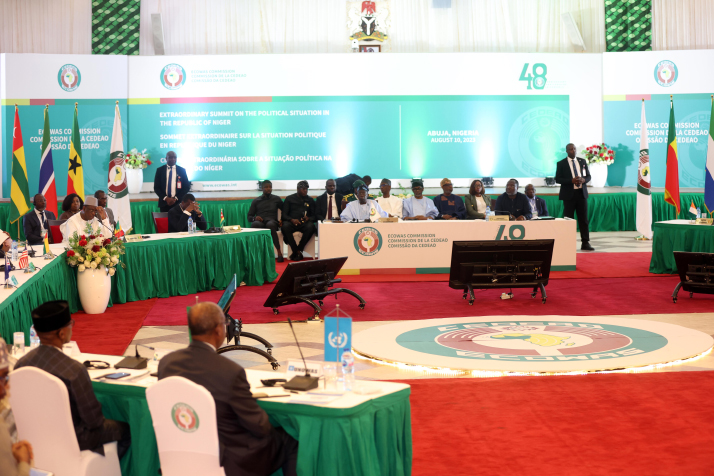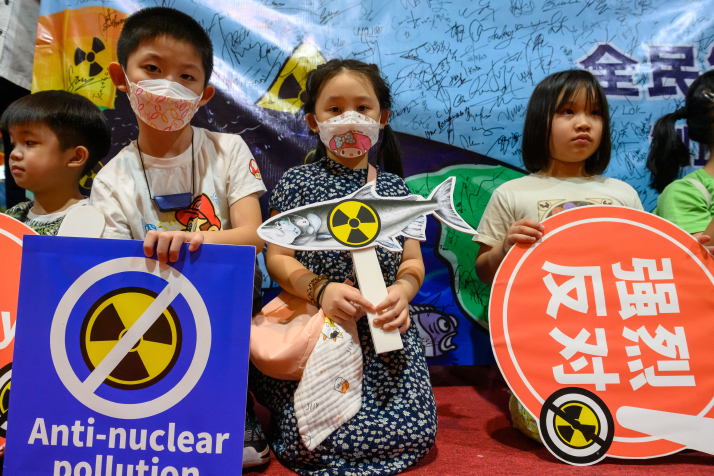| World |
| Top 10 world news stories of 2023 | |
|
|
 Palestinians pass buildings destroyed in Israeli airstrikes in the southern Gaza Strip city of Rafah on October 12 (XINHUA)
1 Intensified Palestinian-Israeli Conflict Around 7 a.m. on October 7, the Palestinian Islamic Resistance Movement (Hamas) waged a surprise attack on Israel, firing at least 5,000 rockets into the country and launching ground attacks on the Israeli towns bordering the Palestinian enclave, the Gaza Strip. Israel subsequently launched retaliatory airstrikes on the Hamas-ruled Gaza Strip and imposed a siege on the densely inhabited area. As of December 21, this latest military conflict between Israel and the Palestinian militant group had claimed over 20,000 lives and drawn increasingly strong worldwide calls for an immediate ceasefire and an early end to the bloodshed. Since the outbreak of the still ongoing conflict, China has maintained close communication with related parties, actively participated in UN Security Council consultations, and made every effort to promote peace talks and a deescalation of the situation. China firmly believes that the fundamental way out of the Palestinian question, which is at the heart of broader conflict in the Middle East, lies in the implementation of the two-state solution, which guarantees an independent Palestinian state according to the 1967 borders, with East Jerusalem as its capital.  A press conference held for the International Monetary Fund's release of the World Economic Outlook report is underway in Marrakech, Morocco, on October 10 (XINHUA)
2 Sluggish World Economic Recovery Global economic growth continued to be slow and uneven in 2023 as economies emerged from the shadows of the COVID-19 pandemic. The challenge is more pronounced in advanced economies than in emerging and developing markets. According to the International Monetary Fund's October World Economic Outlook, global growth is forecast to slow from 3.5 percent in 2022 to 3 percent in 2023 and 2.9 percent in 2024. The UN Conference on Trade and Development also reported in October that world economic growth is expected to decelerate from 3 percent last year to 2.4 percent through 2023, with limited signs of a rebound in 2024. Countries are in varying stages of economic recovery, but they face many common challenges. The intensification of geoeconomic fragmentation will not only mean high costs for global prosperity but also hamper multilateral cooperation on providing crucial public goods, such as fighting climate change and future pandemics, and ensuring energy and food security. Under such circumstances, strengthening cooperation and jointly addressing the global economic downturn have become especially important issues for the international community.  Chinese President Xi Jinping and his U.S. counterpart Joe Biden take a walk after their talks in the Filoli Estate in the U.S. state of California, on November 15 (XINHUA)
3 Xi-Biden Historic Summit At the invitation of U.S. President Joe Biden, Chinese President Xi Jinping traveled to the United States from November 14 to 17 for a China-U.S. summit and the 30th Asia-Pacific Economic Cooperation Leaders' Meeting. Xi and Biden on November 15 held a positive, comprehensive and constructive summit, charting the course for improving and developing bilateral ties. The historic summit came at a critical juncture as the international community pushes for a more stable China-U.S. relationship. Face to face, the two heads of state put forward guiding principles on the most prominent issues between the two countries, such as developing a correct understanding of each other, properly managing differences, and strengthening dialogue and cooperation. They further discussed the right way for both countries to get along with each other, clarified their shared responsibilities as major countries, and mapped out the direction and blueprint for the sound, stable and sustainable development of China-U.S. relations.  The OpenAI website (FILE)
4 ChatGPT Leads AI Development The chatbot ChatGPT, which debuted in November 2022, has gone viral in 2023, with its developer OpenAI gaining more than 100 million active users in just two months after its launch. In January, Microsoft announced that it would make a large investment in OpenAI to accelerate its technological breakthroughs in the field of artificial intelligence (AI). In March, OpenAI released GPT-4, the latest language model for the ChatGPT AI chatbot. With ChatGPT leading a new wave of generalist large language model (LLM) technology development, the world is pooling AI innovation resources to carry out research into LLM algorithms and key technologies. The rapid growth of generative AI technology has created new opportunities for economic and social development. However, it has also given rise to issues like the dissemination of false information and the compromise of personal data security. On August 15, an interim regulation on the management of generative AI services went into effect in China. After that, Chinese search giant Baidu launched its ChatGPT-like service ERNIE Bot for public use. It is one of the first batch of Chinese companies given permission to allow regular public access to generative AI bots.  A building damaged in a Ukraine-launched drone attack in Moscow, Russia, on July 30 (XINHUA)
5 Russia-Ukraine Conflict Continues The Ukraine crisis continues to drag on, with millions of people displaced. The crisis has also caused many casualties, created geopolitical confrontation in Europe, intensified global energy and food shortages, and undermined regional and international security. Russia and Ukraine appear to have reached a deadlock on the battlefield and at the negotiating table. Yevgeny Prigozhin, head of the Wagner military group that made its name known to the world by fighting Ukraine on the battlefield, attempted to organize an armed rebellion in Moscow on June 23. He instead reached a compromise with Moscow through the mediation of Belarusian President Alexander Lukashenko a day later. On August 23, Prigozhin and some senior members of the Wagner group died of an air crash in Russia's Tver Region, en route from Moscow to St. Petersburg. To push forward the political settlement of the ongoing Russia-Ukraine conflict, the Chinese Foreign Ministry released a paper stating Beijing's position on the issue in February. In the paper, China put forward a 12-point proposal to end the conflict in Ukraine by addressing both the symptoms and the root causes of the crisis, and reiterated the necessity to end the conflict through dialogue and negotiation.  A man takes photos at the media center of the 15th BRICS Summit in Johannesburg, South Africa, on August 21 (XINHUA)
6 BRICS Membership Expansion The first face-to-face summit after COVID-19 of BRICS, a group named after the world's five leading emerging economies—Brazil, Russia, India, China and South Africa—was held in Johannesburg, South Africa, on August 22-24. Key agenda items discussed included closer cooperation and the expansion of the group's membership. At the summit, leaders agreed to invite six more countries—Argentina, Egypt, Ethiopia, Iran, Saudi Arabia and the United Arab Emirates—to become members as of January 1, 2024. As the BRICS concept gains increasing recognition, the group has become an important force in shaping the international landscape. The value of BRICS stems from the independence, equality, openness and inclusiveness it promotes. Successful BRICS cooperation brings confidence to developing countries that hope to accelerate their development while maintaining their independence. Since the very beginning, the BRICS mechanism has been guided by the principle of dialogue without confrontation and partnerships instead of military alliances. BRICS countries are committed to observing the purposes and principles of the UN Charter, international law and basic norms governing international relations.  Iranian Deputy Foreign Minister Alireza Bigdeli (second right) cuts a ceremonial ribbon to reopen the Iranian Embassy in Riyadh, Saudi Arabia, on June 6 (XINHUA)
7 Iran-Saudi Arabia Reconciliation After years of open hostility, Saudi Arabia and Iran agreed to restore diplomatic ties after engaging in talks facilitated by China. In a statement jointly released with China on March 10, Saudi Arabia and Iran agreed to reopen their embassies and diplomatic missions within two months, hold talks between their foreign ministers on arrangements for exchanging ambassadors, and explore ways to improve bilateral ties. On April 6, Saudi Arabian Foreign Minister Prince Faisal bin Farhan Al Saud and Iranian Foreign Minister Hossein Amir-Abdollahian met in Beijing and confirmed the two countries' commitment to resuming diplomatic relations. The handshake between the two Middle Eastern countries in Beijing was a major win for security and stability in the Middle East. It is considered a victory for dialogue and peace and a testament to the effectiveness of China's diplomatic approach, as well as its growing global role.  People wait to withdraw funds outside the Silicon Valley Bank headquarters in Santa Clara, California, the United States, on March 13 (XINHUA)
8 U.S. Banking Crisis On March 10, the Silicon Valley Bank declared bankruptcy, becoming the second largest bank failure in the history of the United States. This incident subsequently triggered turmoil in the U.S. and global banking industries. A week later, U.S. regional banks Signature Bank and First Republic Bank saw spectacular collapses. The repercussions also reverberated across the Atlantic. As European banks, including Switzerland's Credit Suisse, edged closer to a similar crisis, concerns grew that the regional crisis could become systemic. The suspected culprit for the festering crisis in 2023 was the U.S. Federal Reserve's monetary policy, which aggressively raised rates in a bid to curb rampant inflation. These rate hikes continued to put significant pressure on the global financial system throughout the year.  Participants at an emergency meeting of the Economic Community of West African States in Abuja, Nigeria, on August 10 (XINHUA)
9 Political Instability in Africa's Sahel Region A military takeover took place in Gabon on August 30, the eighth successful coup to take place in Central and West Africa since 2020. With the exception of the coup that took place in Myanmar in 2021, all recent coups have taken place in Africa's Sahel region, and were described by UN Secretary General António Guterres as "an epidemic of coup d'états." The UN, the African Union and other international organizations have repeatedly called on related parties to exercise restraint and enhance dialogue. Regional bodies such as the Economic Community of West African States have imposed sanctions on some countries and said they have not ruled out the possibility of military intervention. Guterres said in August conditions need to be created that allow African citizens to address the root causes of political instability—lack of development being a major factor.  Children participate in a rally opposing Japan's dumping of nuclear-contaminated water into the ocean, in Selangor state, Malaysia, on August 27 (XINHUA)
10 Japan's Discharge of Nuclear-Contaminated Water
The Japanese Government, in disregard of strong criticism and opposition from the international community, began releasing nuclear-contaminated water from the Fukushima Daiichi power plant into the Pacific Ocean on August 24. The power plant was destroyed in March 2011 after a massive 9.0-magnitude earthquake generated powerful tsunami waves that caused the meltdowns of three of its nuclear reactors—one of the worst nuclear disasters in history. The more than 1.3 million tons of wastewater—enough to fill more than 500 Olympic-size swimming pools—currently contained at the plant are now being released into the ocean in a process that could take up to 40 years to complete. By dumping the nuclear-contaminated water into the ocean, Japan is spreading huge risks to the rest of the world, and openly passing long-term harm onto future generations of humanity. |
|
||||||||||||||||||||||||||||||
|